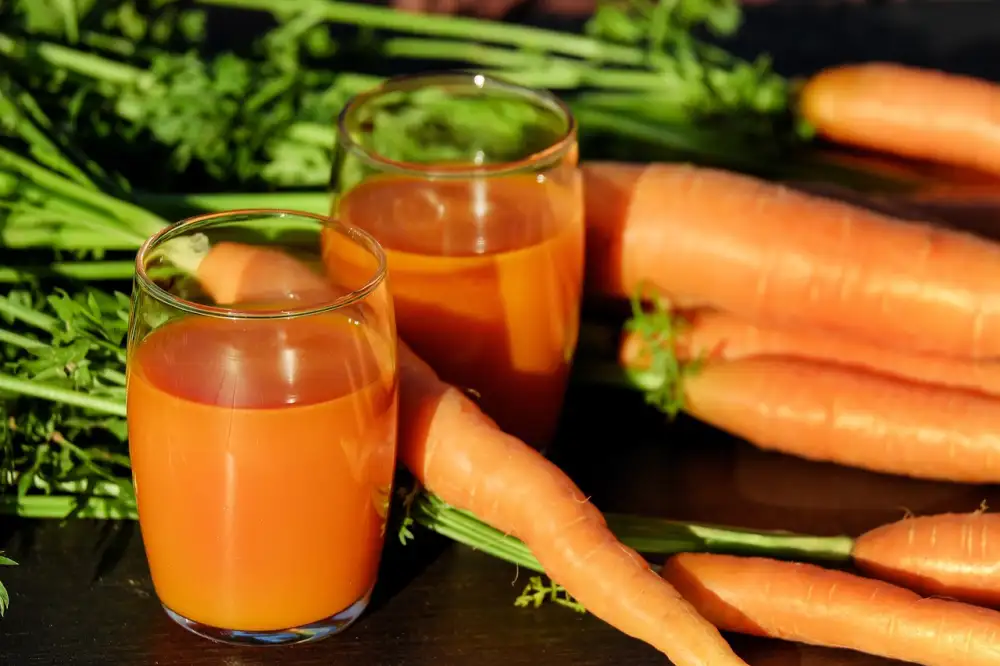Revitalize Your Health with a Refreshing Juice Diet: Discover the Benefits and Recipes

Are you looking for a way to revitalize your health and boost your energy levels? Look no further than the juice diet! This popular trend has gained traction in recent years as more and more people are discovering the incredible benefits of incorporating fresh juices into their daily routine. Whether you're aiming to lose weight, detoxify your body, or simply improve your overall well-being, the juice diet can be a game-changer. In this article, we will explore the various benefits of the juice diet, how it works, different types of juices to include, tips for success, potential risks and precautions, and answer some frequently asked questions. So get ready to embark on a journey towards a healthier lifestyle with the refreshing power of juices!
Benefits of the Juice Diet
The Juice Diet offers numerous benefits for your health and well-being. Firstly, it provides a convenient and efficient way to consume a wide variety of fruits and vegetables, ensuring that you receive essential nutrients, vitamins, and minerals. These nutrients are easily absorbed by the body in juice form, promoting better digestion and nutrient absorption.
Secondly, the Juice Diet can help with weight loss. By replacing high-calorie meals with nutrient-dense juices, you can reduce your overall calorie intake while still satisfying your hunger. The high fiber content in juices also helps to keep you feeling full for longer, reducing cravings for unhealthy snacks.
Additionally, the Juice Diet is known to boost energy levels. The natural sugars present in fruits provide an instant energy boost without the crash associated with caffeine or processed sugars. Regular consumption of fresh juices can improve mental clarity and focus throughout the day.
Furthermore, the Juice Diet supports detoxification and cleansing of the body. Juices act as natural cleansers by flushing out toxins from your system, aiding in liver function and promoting clearer skin. This detoxification process can also strengthen your immune system and improve overall health.
Lastly, the Juice Diet promotes hydration. Many people struggle to drink enough water throughout the day, but consuming fresh juices can help meet your daily fluid requirements while providing additional health benefits.
In summary, the Juice Diet offers a range of benefits including improved nutrition intake, weight loss support, increased energy levels, detoxification benefits, and enhanced hydration. Incorporating fresh juices into your diet can revitalize your health and contribute to a healthier lifestyle overall.
How the Juice Diet Works
The juice diet works by replacing solid meals with freshly squeezed juices made from fruits and vegetables. These juices are rich in vitamins, minerals, and antioxidants that help nourish the body and promote overall health.
During a juice diet, individuals consume only juice for a certain period of time, typically ranging from a few days to a few weeks. This allows the digestive system to rest and detoxify while still providing essential nutrients.
The process of juicing removes the fiber from fruits and vegetables, making it easier for the body to absorb the nutrients. This allows the digestive system to work less and redirect energy towards other bodily functions such as repairing cells and eliminating toxins.
By consuming nutrient-dense juices, individuals can experience increased energy levels, improved digestion, clearer skin, weight loss, and enhanced immune function. The juice diet also helps reset taste buds and reduce cravings for unhealthy foods.
It is important to note that while the juice diet can be beneficial for short-term detoxification or weight loss goals, it should not be followed as a long-term solution. It is recommended to consult with a healthcare professional before starting any new diet plan to ensure it aligns with individual needs and goals.
Types of Juices to Include in the Diet
When it comes to the juice diet, variety is key. Including a wide range of juices in your diet ensures that you receive a diverse array of nutrients and flavors. Here are some types of juices that you can include in your juice diet:
1. Green Juice: Packed with leafy greens like spinach, kale, and cucumber, green juices are rich in vitamins, minerals, and antioxidants. They help detoxify the body and boost energy levels.
2. Citrus Juice: Oranges, grapefruits, lemons, and limes make delicious citrus juices that are high in vitamin C. These juices support immune function and promote healthy skin.
3. Beetroot Juice: Beetroot juice is known for its vibrant color and numerous health benefits. It contains nitrates that may improve exercise performance and lower blood pressure.
4. Carrot Juice: Carrots are a great source of beta-carotene, which converts to vitamin A in the body. Carrot juice promotes healthy vision and supports skin health.
5. Berry Juice: Berries like strawberries, blueberries, raspberries, and blackberries are packed with antioxidants that protect against cell damage and inflammation.
6. Watermelon Juice: Refreshing watermelon juice is not only hydrating but also contains lycopene, which may have heart-protective effects.
7. Pineapple Juice: Pineapple juice is rich in bromelain, an enzyme that aids digestion and reduces inflammation.
Remember to choose organic fruits and vegetables whenever possible to minimize exposure to pesticides. Experiment with different combinations of fruits and vegetables to find the flavors that suit your taste buds best!
Tips for a Successful Juice Diet
1. Choose fresh, organic produce: Opt for locally sourced fruits and vegetables to ensure maximum nutritional value and avoid harmful pesticides.
2. Mix up your flavors: Experiment with different combinations of fruits and vegetables to keep your taste buds excited and prevent boredom.
3. Stay hydrated: In addition to consuming juice, it's important to drink plenty of water throughout the day to stay properly hydrated.
4. Listen to your body: Pay attention to how you feel during the juice diet. If you experience any discomfort or unusual symptoms, consult a healthcare professional.
5. Start slowly: Ease into the juice diet by gradually replacing one meal or snack with a juice. This will help your body adjust and reduce any potential side effects.
6. Incorporate fiber-rich foods: While on the juice diet, include some fiber-rich foods like chia seeds or flaxseeds to maintain regular bowel movements.
7. Practice mindful eating: Even though you're consuming liquids, take time to savor each sip and be present in the moment. This can help you feel more satisfied and prevent overeating later on.
8. Plan ahead: Prepare your juices in advance so that they are readily available when hunger strikes. This will prevent you from reaching for unhealthy alternatives.
Remember, consulting with a healthcare professional before starting any new diet is always recommended for personalized advice and guidance on achieving your health goals.
Potential Risks and Precautions
While the juice diet can offer numerous health benefits, it is important to be aware of potential risks and take necessary precautions. Here are a few things to consider before starting a juice diet:
1. Nutrient Deficiencies: Since the juice diet involves consuming primarily fruits and vegetables, it may lead to deficiencies in certain nutrients such as protein, fiber, and healthy fats. It is important to ensure that you are still getting these essential nutrients from other sources.
2. Blood Sugar Imbalances: Juices are high in natural sugars, which can cause spikes in blood sugar levels. This can be problematic for individuals with diabetes or those who struggle with blood sugar regulation. If you have any underlying health conditions, consult with a healthcare professional before starting a juice diet.
3. Lack of Satiety: Juices lack the fiber content found in whole fruits and vegetables, which helps promote feelings of fullness and satiety. As a result, some people may find it difficult to stick to a juice-only diet for an extended period of time.
4. Weight Loss Plateaus: While the initial weight loss on a juice diet can be significant, it may eventually plateau as the body adjusts to the reduced calorie intake. This can be frustrating for those seeking long-term weight loss results.
To minimize these risks and maximize the benefits of a juice diet, consider the following precautions:
1. Consult with a healthcare professional before starting any new diet or making significant changes to your current eating habits.
2. Incorporate variety into your juices by using different fruits and vegetables each day to ensure you are getting a wide range of nutrients.
3. Consider adding small amounts of protein-rich ingredients like chia seeds or Greek yogurt into your juices to help maintain muscle mass and prevent nutrient deficiencies.
4. Monitor your blood sugar levels closely if you have diabetes or other blood sugar-related conditions while on the juice diet.
By being mindful of these risks and taking necessary precautions, you can safely enjoy the benefits of a juice diet while minimizing any potential negative effects.
Frequently Asked Questions about the Juice Diet
1. Is the juice diet suitable for everyone?
The juice diet is generally safe for most people. However, it may not be suitable for individuals with certain medical conditions such as diabetes or kidney problems. It's always best to consult with a healthcare professional before starting any new diet.
2. Can I replace all my meals with juices?
While some people choose to replace all their meals with juices, it is recommended to include solid foods in your diet as well. Juices can be a great addition to a balanced meal plan, but they should not be the sole source of nutrition.
3. Will I lose weight on a juice diet?
Many people experience weight loss on a juice diet due to its low-calorie nature. However, the amount of weight loss will vary from person to person depending on factors such as metabolism and activity level.
4. Can I exercise while on a juice diet?
Light exercise such as walking or yoga is generally safe during a juice diet. However, intense workouts may not be advisable due to the reduced calorie intake. Listen to your body and adjust your exercise routine accordingly.
5. How long should I follow a juice diet?
The duration of a juice diet can vary depending on individual goals and preferences. Some people choose to do a short-term cleanse for a few days, while others incorporate juices into their long-term lifestyle. It's important to listen to your body and make sure you're getting adequate nutrition.
6. Can I drink store-bought juices instead of freshly made ones?
Freshly made juices are always preferred over store-bought ones because they contain more nutrients and fewer additives or preservatives. If store-bought juices are your only option, make sure they are 100% natural without added sugars or artificial ingredients.
Remember, it's essential to consult with a healthcare professional before making any significant changes to your diet or lifestyle.
In conclusion, the juice diet can be a great way to revitalize your health and boost your energy levels. It offers numerous benefits, such as weight loss, improved digestion, increased nutrient intake, and detoxification. However, it is important to consider whether the juice diet is right for you. If you have any underlying health conditions or are on medication, it is essential to consult with a healthcare professional before starting this diet. Additionally, it may not be suitable for everyone, especially those who require a higher calorie intake or have specific dietary needs. Ultimately, the decision to try the juice diet should be based on your individual goals and preferences.
Published: 29. 12. 2023
Category: Health



